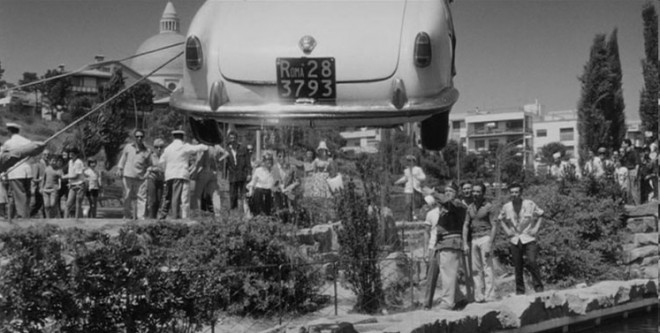Like most cinéastes, I consider Michelangelo Antonioni one of the two supreme artists of Italian cinema, the other one being Roberto Rossellini. (Fools and scoundrels prefer Vittorio De Sica and Federico Fellini.) When I purchased the DVD of Le amiche (The Girlfriends) without ever having seen the film but having read that this was Antonioni’s first great film, the first one to bear his artistic signature, I had high hopes. But the film contained so much plot and so many important characters—hardly a criticism that may be leveled at Antonioni’s masterpieces—I was left dispirited and disappointed. Now I have returned to Le amiche, apparently with refreshed eyes. I have finally broken through the barrier of expectations and profuse dialogues (which, in my case, means scrambling to keep up with English subtitles) and have actually seen what there is to see. What a stunning film!
The script, by Antonioni and Suso Cecchi d’Amico, is based on Cesare Pavese’s 1949 story “Tre Donne Sole” (“Three Women Sun”). (Because this is primarily a film about women, it is fortunate that Antonioni had Cecchi d’Amico onboard.) The considerable plot centers on Clelia (Eleonora Rossi Drago, wonderful), who has returned from Rome to Turin, her hometown, to manage a fashion salon. In the hotel room next to hers, Rosetta (Madeleine Fischer) attempts suicide by pill overdose, drawing Clelia into Rosetta’s circle of friends, which is dominated by sharp-tongued Momina (Yvonne Furneaux, later of Fellini’s La dolce vita and Roman Polanski’s Repulsion), whose extramarital lover, it turns out, is the architect of Clelia’s salon. Clelia herself falls in love with Carlo, the architect’s assistant, while Rosetta has been stretched to the breaking point by her affair with Lorenzo, a painter who is jealous of fiancée Nene’s greater commercial success. Nene (Valentina Cortese, brilliant—best supporting actress, Italian National Syndicate of Film Journalists) is a ceramics artist. Once Rosetta has recovered, Momina coldbloodedly encourages her pursuit of Lorenzo. (What a pal: At one point she chides fragile Rosetta for the incompetence that her unsuccessful suicide attempt demonstrates.) Rosetta’s next try at suicide succeeds. At the salon, Clelia “loses it” and publicly lambasts Momina. Unexpectedly, Clelia’s boss doesn’t terminate her employment; Clelia can work again for the firm back in Rome. Lorenzo ends back in Nene’s arms. He asks why she puts up with him. Nene responds, with subtly devastating rue, “Perhaps because you come at so high a price.” Clelia leaves by train for Rome as Carlo hides while watching her depart, fearful of exposing his broken heart.
All I can say is: wow! Vincente Minnelli or Douglas Sirk might have tackled a plot as complicated as this one; but Antonioni? None of it ultimately matters, though, because the plot counts for almost nothing in Le amiche. Antonioni has created a solemn, sensible vision, one without recourse to religion, in which what matters most are the psychological inquiry, especially into the mental lives of the female characters, their unsettled spiritual state, and the shimmering poetry of Turin’s deserted streets at night, which is correlative to this. As a result, for all its narrative complexity, Le amiche looks ahead to Il grido (The Cry, 1957), in which Antonioni radically continues Rossellini’s experiments at unhinging plot in Francesco, giullare di Dio (1950) and Voyage in Italy (1953).
Assisting Antonioni in the elusive, mysterious atmosphere that he conjures is composer Giovanni Fusco’s delicately haunting music and Gianni di Venanzo’s evocative black-and-white cinematography. Fusco and di Venanzo would remain members of the Antonioni team.
Antonioni was named best director by the Italian National Syndicate of Film Journalists. Just missing the Golden Lion of St. Mark, Le amiche took the silver prize at Venice.
B(U)Y THE BOOK
MY BOOK, A Short Chronology of World Cinema, IS CURRENTLY AVAILABLE FROM THE SANDS FILMS CINEMA CLUB IN LONDON. USING EITHER OF THE LINKS BELOW, ACCESS THE ADVERTISEMENT FOR THIS BOOK, FROM WHICH YOU CAN ORDER ONE OR MORE COPIES OF IT. THANKS.
